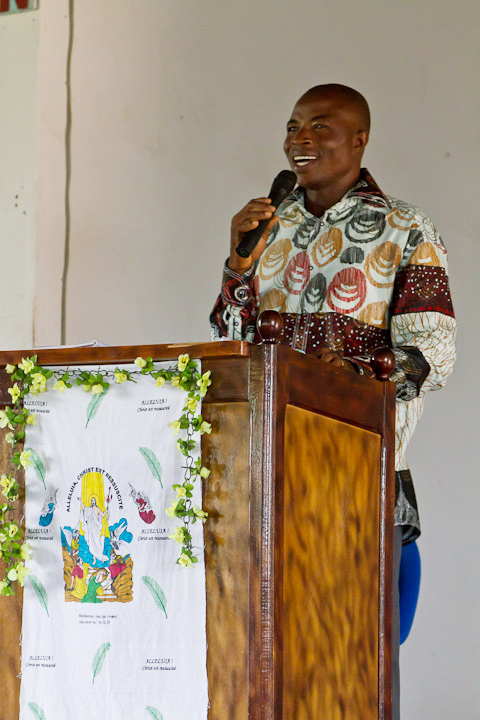
BROBO, Ivory Coast (BP)–It is the day of Pentecost, and pastor Dabilla Kambou stands smiling in front of an armed soldier at a military checkpoint outside Brobo, the village Kambou wants to enter. The pastor is known for his wide grin that can defuse the most tense situations.
The guard can’t help but smile back as he shakes Kambou’s hand and asks, “Where are you going?”
“To church,” Kambou replies, “for the big celebration.”
A minute later he’s back on his motorcycle and on his way again, still smiling. “That’s nothing,” he says of the easy encounter.
During Ivory Coast’s nearly nine-year-long civil war, most encounters at military checkpoints were intimidating. Soldiers would all but strip search civilians and rummage through their bags for weapons and anything of value. Individuals found suspect often were beaten, jailed and sometimes executed.
Kambou would make the nearly 20-mile journey from Bouaké to Brobo every month by bicycle. Otherwise, traveling in a personal motor vehicle almost guaranteed he would be accosted and have the vehicle commandeered by soldiers.
“It was hard,” Kambou says, shaking his head. “The war didn’t do any good for our country, but good things did happen during the war.”
Those good things are the reason for the celebration he is attending at Brobo Baptist Church. Throughout the war, the congregation not only preserved, but thrived.
Deacon Arnaud Kouassi Brou explains his congregation’s decision to set aside a day of jubilation: “We wanted to stop everything and give thanks. We need to recognize all that God has done.”
In 2003, Brobo was flooded with refugees from nearby Bouaké, Ivory Coast’s second-largest city. International peacekeepers had established Brobo as a demilitarized zone, and it became a safe haven for people fleeing the fighting between government and rebel troops.
Brobo Baptist Church had over a dozen new believers who wanted to be baptized, but they had no pastor. So they called on Kambou, who pastors a Baptist church in Bouaké.
That long bicycle ride to baptize 15 men and women was the first of many as he became their “honorary pastor.” Kambou returned once a month to preach, often baptizing new believers after the Sunday services.
“I baptized the majority of the members of their church,” he says. “They were people who fled the war zones. They had no idea they would encounter Jesus here.”
Kambou soon began holding leadership training workshops with the church’s deacons and elders. He was impressed by their wisdom and passion for their church.
“They’re such smart people. I just needed to help them develop a vision [for the church] and then they ran with it,” he recounts.
The group focused on keeping the church unified during the ongoing, bloody strife. They met with the village chief and the mayor to establish that they had no political interest. “We supported neither one side nor the other; we were there for our community,” Brou says.
One community project the church spearheaded was the construction of a mill for the village to process rice and corn. “People often say that Christians don’t do anything but pray,” Brou laughs. “We want to show them that in addition to prayer, we attend to the social needs of the community.”
Kambou was amazed by their initiative. “It wasn’t an idea I gave them. They came up with it on their own through the wisdom they received from God,” he said. “He opened their eyes to ways the church can reach out.”
In early 2011, Ivory Coast erupted with violence once again, and it had a profound effect on Brobo. Hundreds of thousands of refugees fled the commercial capital of Abidjan and headed into the country’s interior. Villages like Brobo saw their populations double, even triple, as residents of the city sought refuge in their ancestral villages.
“The months were a time we will never forget. It was such a difficult time,” Brou recalls.
Despite the difficulties, the church remained strong and members took care of each other. “If someone had two kilos of rice, he’d give one kilo to another. If someone had some yams, they would share them. We spent the two months unified as a church,” Brou saysa.
He points to Scripture as the inspiration for their thanksgiving celebration on Pentecost. “We have been studying the Book of Acts and we wanted to eat together, fellowship and worship in agape love like the disciples used to.”
Christians around the world remember Pentecost as a day the unifying power of the Holy Spirit was made evident. On this Pentecost in Brobo, the Spirit moved again, bringing believers from different denominations, ethnic groups and political parties together for the unified purpose of glorifying God.
Brobo Baptist Church invited representatives from all the other evangelical churches in the area to praise the Lord and share a meal.
“We didn’t buy this food here,” Brou says as he proudly points to the dozens of covered pots in the church. “Each church member prepared food and brought it to share with everyone.”
–30–
William Haun is a long-term volunteer who works alongside the International Mission Board’s global communication team. To see more photos and video from Ivory Coast, visit www.africastories.org.
















